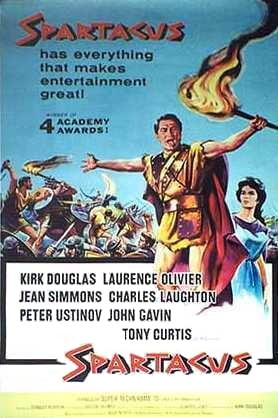
Human Desires so Strong they changed the course of History…of a Rebellion that shook a Civilization in a Pagan era, 71 B.C….the grandeur and might of Rome and the challenge of an immortal gladiator…of a love that changed the world.
Spartacus is a 1960 American epic historical drama film directed by Stanley Kubrick, written by Dalton Trumbo, and based on the 1951 novel of the same title by Howard Fast. It is inspired by the life story of Spartacus, the leader of a slave revolt in antiquity, and the events of the Third Servile War, and stars Kirk Douglas in the title role, Laurence Olivier as Roman general and politician Marcus Licinius Crassus, Peter Ustinov, who won an Academy Award for Best Supporting Actor, as slave trader Lentulus Batiatus, John Gavin as Julius Caesar, Jean Simmons as Varinia, Charles Laughton as Sempronius Gracchus, and Tony Curtis as Antoninus.
Douglas, whose company Bryna Productions was producing the film, removed original director Anthony Mann after the first week of shooting. Kubrick, with whom Douglas had worked before, was brought on board to take over direction. It was the only film directed by Kubrick where he did not have complete artistic control. Screenwriter Dalton Trumbo was blacklisted at the time as one of the Hollywood Ten. Douglas publicly announced that Trumbo was the screenwriter of Spartacus, and President-elect John F. Kennedy crossed American Legion picket lines to view the film, helping to end blacklisting; Howard Fast was also blacklisted, and originally had to self-publish it.
The film won four Academy Awards and became the biggest moneymaker in Universal Studios‘ history, until it was surpassed by Airport (1970). In 2017, it was selected for preservation in the United States National Film Registry by the Library of Congress as being “culturally, historically, or aesthetically significant.”

 Buy me a coffee
Buy me a coffee